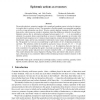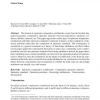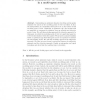115
click to vote
JCAL
2011
14 years 9 months ago
2011
: Players of epistemic games--computer games that simulate professional practica— have been shown to develop epistemic frames: a profession’s particular way of seeing and solvi...
104
click to vote
SYNTHESE
2010
15 years 26 days ago
2010
I develop a strategy for representing epistemic states and epistemic changes that seeks to be sensitive to the difference between voluntary and involuntary aspects of our epistemi...
101
click to vote
SLOGICA
2010
15 years 27 days ago
2010
Abstract. Representing an epistemic situation involving several agents obviously depends on the modeling point of view one takes. We start by identifying the types of modeling poin...
144
click to vote
LOGCOM
2007
15 years 2 months ago
2007
We provide algebraic semantics together with a sound and complete sequent calculus for information update due to epistemic actions. This semantics is flexible enough to accommoda...
104
click to vote
SYNTHESE
2008
15 years 2 months ago
2008
The interest of epistemic comparative conditionals comes from the fact that they represent genuine `comparative epistemic relations' between propositions, situations, evidence...
110
click to vote
SYNTHESE
2008
15 years 2 months ago
2008
I will assume here the defenses of epistemic infinitism are adequate and inquire as to the variety standpoints within the view. I will argue that infinitism has three varieties dep...
124
click to vote
ENTCS
2006
15 years 2 months ago
2006
We refine our algebraic axiomatization in [8,9] of epistemic actions and epistemic update (notions defined in [5,6] using Kripke-style semantics), to incorporate a mechanism for d...
124
click to vote
WM
2003
15 years 3 months ago
2003
Techniques for computation on generalized diagrams are defined and the KM implications are explored. Descriptive Computing is presented and plan computation based on world models t...
113
click to vote
DAGSTUHL
2007
15 years 4 months ago
2007
Representing an epistemic situation involving several agents depends very much on the modeling point of view one takes. In fact, the interpretation of a formalism relies quite a lo...
120
click to vote
LORI
2009
Springer
15 years 7 months ago
2009
Springer
We present in this work a sound and complete modal logic called EDLA (Epistemic Dynamic Logic of Agency) integrating the concepts of joint action, preference and knowledge and ena...




